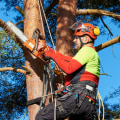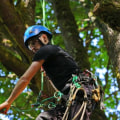Arboriculture involves caring for individual trees, whereas urban forestry deals with forests as systems (groups of trees) in a developed environment. The science of arboriculture focuses on proper tree planting, pruning, fertilization, water and other maintenance issues. What is the main difference between urban forestry and forestry People. What Leads to a Difference in Management.
There is a clear overlap: traditional forestry takes care of wildlife and recreation, as well as production. However, forestry has traditionally focused on wood production, and that is what my degree focused heavily on: how to measure the amount of wood standing, how to obtain higher quality wood, how to manage the forest so that I can harvest wood indefinitely (sustainability). Less attention was paid to the benefits of ecosystems, such as clean air and water, and education for the general public was not part of the mix. Most of my classmates dedicated themselves to forestry to stay away from people.
Urban Forestry Focuses on the Role Trees Play in Making Our Cities More Livable. And continuing to have trees requires that we reach out to the general public and provide education. Arboriculture and urban forestry science includes proper tree selection, planting and care. We specialize in diagnosing tree health disorders, selecting trees for unique urban spaces, and sustainably managing tree care.
Landscape designers have hired us to select high-profile award-winning landscape trees and implement programs for tree health management. Urban Forestry & Arboriculture involves tree management in cities and suburbs, where more than 80% of people live in the United States. More than 50% of the world's population lives in cities and suburbs, which are the fastest growing communities in the country. As this trend continues, urban arborists and foresters strive to preserve trees during construction and replace trees that were removed during.
Trees take on special importance in urban areas, where their greatest value is aesthetics, climate modification and habitat for urban wildlife. Urban, residential and park environments are especially challenging for trees due to the compaction of soils, pavement, utility lines and buildings. Urban foresters and arborists work to ensure healthy tree populations that provide sustained benefits to billions of people. Students in the Urban Forest and Arboriculture concentration are qualified to earn professional credentials through an examination by the Massachusetts Arborist Association and the International Arboricultural Society.
Arborists care for individual trees while foresters manage tree populations. For example, a forester may be responsible for managing a forest or a grove for the production of wood or other wood products. The forester will make decisions about when and how to plant and harvest trees to meet their management objectives. Urban foresters manage the public tree population in a community to maximize the benefits provided by trees, while minimizing the inherent risk of living near these trees.
A municipal forester would be an urban forester working for a particular town or city that manages public tree resources in that municipality. This would include trees in parks and other public green spaces, as well as street trees and trees that grow in other municipal rights of way. Urban forestry is the management of trees in the urban landscape. It is independent of arboriculture in the sense that it encompasses the management of trees as a complete system, as well as individually.
At Urban Forestry Associates, we see the urban forest for trees and the forest. The urban forest serves many functions and quietly provides benefits that are often not appreciated. However, without management, this functioning urban ecosystem can serve as a host of diseases, a liability for landlords and a danger to the safety of all. UFA staff have degrees in forestry science and have in-depth knowledge of tree anatomy, forestry, ecology, tree pathology and soil science.
International Arboricultural Society 270 Peachtree Street NW Suite 1900 Atlanta, GA 30303 United States. This academic publication serves as the ISA's primary means of communication to disseminate the findings of new and original research focusing on the care and management of trees in urban environments. Appropriate topics for the presentation include, but are not limited to, tree biology and physiology, entomology, pathology, horticulture, biomechanics, risk management, soil science, inventory and evaluation, functions and benefits of urban forests, governance planning and management of urban forests, and service forestry public. Students will be exposed and will need to gain a basic understanding of industry practices common to urban arborists and foresters.
Plunkett, BCMA, is an independent consultant arborist with 14 years of experience in the fields of arboriculture and urban forestry. Whether you want to work for a commercial company, municipal or county park, start your own business, or continue studying urban forestry at a four-year university, this program will lay the foundation for your future. There are many terms in use that describe different types of tree care professionals and this can cause considerable confusion for an owner or property manager who needs a tree care provider. The course aims to provide training to help students prepare for the International Arboricultural Society certified arborist exam.
Arboriculture& Urban Forestry (AUF) is the bimonthly peer-reviewed journal of the International Arboricultural Society. His long term of office demonstrates the ISA's commitment to fostering greater appreciation of trees and promoting research, technology and practice of professional arboriculture. I also grew up in a small town and never thought for a minute that I would live in a big city, so I didn't see urban forestry as relevant to me, wow, was I wrong?. .
.






